On December 12th, 2006 I got on a plane and left Senegal for the first time in over 14 months. My companions on this adventure were fellow PCVs from the Kaolack region; Arun, Paul and Shane and we were headed to sub-tropical West Africa; Togo and Ghana. The country we were leaving had not seen rain in 2.5 months and at least for the part North of the Gambia, was turning into a big sandy wasteland. In addition, on the 11th I had a major meltdown in the post office in Kaolack (something about them refusing to open any of the 15 huge bags of packages, one of which, I was sure, contained the watch I had been waiting on for months), it was time for Becca to take a short break from Senegal.
In true Senegalese style, our Air Senegal plane was running 2 hours late, but once we got on the plane we found a veritable feast of airline food unlike any domestic-travel American has seen in a decade. About 4 hours later we were landing in Lome, Togo with lush, green vegetation and a beautiful shoreline. We didn’t take our time in the airport, paid our 15,000 CFA (about $30) for our visas and got a cab to the garage to get public transport to Kpalime a small town in the mountains. The communication was fine because two of us speak French more than well enough to get around but I had a sense of impotence at having to use the colonial language, knowing how French-speakers are viewed here in Senegal, but alas, I speak no Ewe or Twi.
The couple days we spent in Togo at the beginning of our trip were filled with gawking at the greenness, the changing topography and the beautiful fruits and vegetables that they were able to grow in this sub-tropical climate – all very different from Senegal. We also did a little hiking, learned about some of the local plants, saw a local ‘moonshine’ operati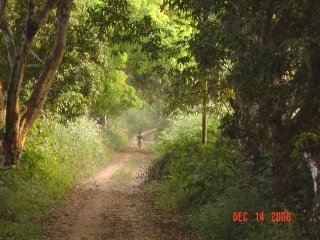 on where men were taking the palm wine they harvested from trees, putting it through some process that involved barrels, rubber hoses and fire, and somehow a sort of palm liquor comes out the other end. This is also where we tasted our first fufu, the national dish of Togo, Ghana and possibly other countries in that region. Fufu is made by pounding cassava root or yam until it is paste-like, and then boiling it (I believe). It comes out as this tasteless, spongy blob of white material that really has a consistency unlike anything else I know, maybe kind of like cream of wheat that has been left out a while and is more solid?? Anyway, they put a stew over the fufu and it is eaten with the hand, even in restaurants. After tasting fufu a couple times, I’m somewhat glad that I didn’t have to endure it in a Togolese village for 2 years, though the environment sure would’ve been nice.
on where men were taking the palm wine they harvested from trees, putting it through some process that involved barrels, rubber hoses and fire, and somehow a sort of palm liquor comes out the other end. This is also where we tasted our first fufu, the national dish of Togo, Ghana and possibly other countries in that region. Fufu is made by pounding cassava root or yam until it is paste-like, and then boiling it (I believe). It comes out as this tasteless, spongy blob of white material that really has a consistency unlike anything else I know, maybe kind of like cream of wheat that has been left out a while and is more solid?? Anyway, they put a stew over the fufu and it is eaten with the hand, even in restaurants. After tasting fufu a couple times, I’m somewhat glad that I didn’t have to endure it in a Togolese village for 2 years, though the environment sure would’ve been nice.
We crossed into Ghana on day 3 of our trip. At the last border stop in Togo, they told us that they couldn’t extend our one-week visa and that we would probably have to pay again to get back into Togo to catch our return flight. We weren’t thrilled at this news, but we were really excited to get to Ghana so we brushed it off. We waited at the border for a little while since the dude there told us that a bus was coming through soon. I’m pretty sure we were all imagining this bus being like the oversized, crowded vans that we had taken in Togo and take all around Senegal, especially by the looks of the scrappy little border village. To our surprise after about 45 minutes a brand new-looking full-sized city bus comes rolling down the dirt road. We took a slight detour but that afternoon ended up in Ho. Ho was a lovely little town and a great introduction to Ghana. Relatively clean and the city’s layout and architecture had an organization to it that reminded me of a more developed country. After the initial big differences, it was funny to note the small differences and similarities in the comparison I couldn’t help making between Ghana and Senegal. The gutters were extremely deep, so deep I 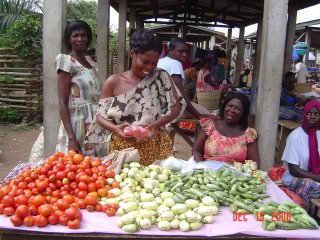 was kind of afraid for my whole stay that I was going to fall in. The shops, like in Senegal, were obviously named with heavy religious overtones. Unlike Senegal however, these store signs were Christian and in English; God’s Eye Photography, The Lord is My Shepherd General Store, Jesus is King Salon, etc. Because of the relative lack of Muslim influence, drinking of alcohol is MUCH more visible, a freedom that I’d say surely has its ups and downs for the community. It was at the restaurant in Ho that we saw they had cat on the menu. Shane attempted to order it but they said they were out, funny because there were plenty of cats running around under the tables while we were eating.
was kind of afraid for my whole stay that I was going to fall in. The shops, like in Senegal, were obviously named with heavy religious overtones. Unlike Senegal however, these store signs were Christian and in English; God’s Eye Photography, The Lord is My Shepherd General Store, Jesus is King Salon, etc. Because of the relative lack of Muslim influence, drinking of alcohol is MUCH more visible, a freedom that I’d say surely has its ups and downs for the community. It was at the restaurant in Ho that we saw they had cat on the menu. Shane attempted to order it but they said they were out, funny because there were plenty of cats running around under the tables while we were eating.
The following day we headed to Wli Falls, supposedly the highest waterfall in West Africa. After some finagling and writing and signing a disclaimer, we worked our way into camping right at the falls, something that seemed like a great idea at the time. The falls were definitely beautiful and we had fun with our little picnic dinner but we started regretting the decision to set up camp so close to the falls later than night; cold, damp and on the hard ground isn’t exactly the most 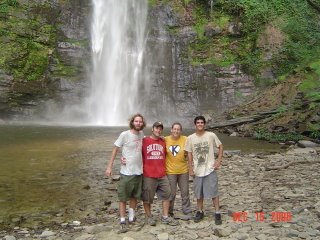 comfortable way to sleep. The next day we hiked up to the upper falls that we couldn’t even see from where we had camped. Our guide, Alfred, was in his mid-40’s, had a bad knee and was wearing flip-flops, yet he was able to prance right up the near vertical climb that nearly leveled Paul and myself. We had to take several breaks and Paul was certain he was going to throw up (though he never did), but as we got to the top and Alfred adjusted the ace bandage around his knee and lit up a smoke, we saw the upper falls up close and it was well worth the minor discomfort of getting there. The upper falls were very similar to the lower falls with the added thrill of being able to look down the 30-meter plunge of the lower falls from above. We caught our breath, took some pictures and headed back down to the sound of traditional, Ghanaian drumming coming from a celebration going on down at the lower falls.
comfortable way to sleep. The next day we hiked up to the upper falls that we couldn’t even see from where we had camped. Our guide, Alfred, was in his mid-40’s, had a bad knee and was wearing flip-flops, yet he was able to prance right up the near vertical climb that nearly leveled Paul and myself. We had to take several breaks and Paul was certain he was going to throw up (though he never did), but as we got to the top and Alfred adjusted the ace bandage around his knee and lit up a smoke, we saw the upper falls up close and it was well worth the minor discomfort of getting there. The upper falls were very similar to the lower falls with the added thrill of being able to look down the 30-meter plunge of the lower falls from above. We caught our breath, took some pictures and headed back down to the sound of traditional, Ghanaian drumming coming from a celebration going on down at the lower falls.
For those of you that know me it’ll come as no surprise to find out that I took a digger that day. Thankfully I didn’t fall on the way up or down that very steep and very long hike, though I’m sure I stumbled more than once, no it was on relatively flat ground after packing up our things. I had my big pack on so not only did I fall but the weight of the bag kept going until my face was right in the dirt, I managed to roll over, turtle on it’s back style, and of course had to get unharnessed before I could actually stand up. Quite embarrassing and the guys didn’t let me forget it, but it makes for good stories, and a good tear in the knee of my pants.
Our next leg of the trip took us to Lake Volta, a huge lake that was formed when they dammed the Volta River in the 60’s. After waiting overnight since we were too late for the ferry that day we headed to the lake bright and early the next morning. We show up and there are folks washing their cars, people doing laundry and a couple pirogues (think large, wooden canoe), but no ferries. We soon found out that the ferry was busted and we’d have to take a pirogue, which ends up being faster than the ferry, great! 4 hours later we’re still waiting for a pirogue to fill up so we can leave. As soon as we threaten to get out and take a car to Accra, they stop us and say they’re ready to leave. The pirogue ride was pretty nice but when we got to the opposite shore there was one van for all the boats clientele and their luggage. We were crammed in like sardines, tighter than anything I’d experienced in Senegal, we were about to leave and that is when four, not skinny, not exactly pleasant or polite women shove themselves and their luggage into the van. At this point breathing is not the easiest both for lack of space and because deodorant isn’t all too common in this part of the world. This van took us to a small town where we caught a ride in a dude’s car to the ferry landing to cross another part of the lake. Holding on for dear life as the guy drove well above 100 km per hour, we got to the ferry right on time for a sunset ferry cruise. On the far shore we looked for a trotro(the van/bus thing that makes up most the public transport here), got in the middle of a fight between the two trotros that wanted to take us and finally got on our way to the final destination of the day, Kumasi. The road to Kumasi was quite exciting, especially at night with a combination of narrow, dirt roads paved highway. The road leading down from the mountains into the city itself was a steep, switchback road that was quite frightening but also quite beautiful from the top where we could see the lights of Ghana’s second biggest city splayed out before us.
Kumasi is the seat of the Asante Kingdom, a kingdom that spread over much o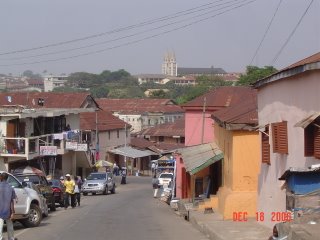 f the region and that was one of the few to have really fought and challenged the colonial powers in the early days of settlement. Kumasi was also unlike anything I had seen on the continent so far. With its beautiful, modern architecture and clean streets it almost looked more European than African. The royal family still lives in Kumasi, in a palace overlooking the city, with peacocks roaming the grounds. I took a tour and learned a lot about Asante history and culture including the sacred stool that is a sign of power throughout the region and the beautiful, woven kente cloth that is traditionally worn, 10 meters at a time, draped, toga style around the wearer.
f the region and that was one of the few to have really fought and challenged the colonial powers in the early days of settlement. Kumasi was also unlike anything I had seen on the continent so far. With its beautiful, modern architecture and clean streets it almost looked more European than African. The royal family still lives in Kumasi, in a palace overlooking the city, with peacocks roaming the grounds. I took a tour and learned a lot about Asante history and culture including the sacred stool that is a sign of power throughout the region and the beautiful, woven kente cloth that is traditionally worn, 10 meters at a time, draped, toga style around the wearer.
That afternoon we met up with Peter Pipin, a friend and co-worker of our fellow PCV, Paula, from back in their days at the Smithsonian Museum of African Art. He treated us to lunch and wonderful conversation an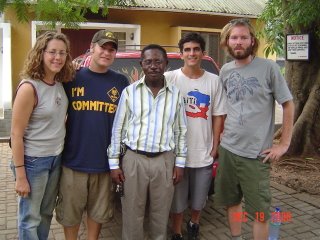 d then we were off. We spent the night at a hotel overlooking a large crater lake and surrounded by tree-covered cliffs, then swung back through Kumasi on our way to Cape Coast. Outside Cape Coast we stayed at a place called Hans Boatel that was surrounded by a pond that is home to several alligators. Kitschy, the restaurant and bar was actually made up of little island-like gazebos on stilts. The guys had a little too much fun that night, involving lots of beer, a swimming pool and some Danish girls, so no one was really aching to do the canopy walk that had been planned for the day. Instead we stopped by one of the many slave castles that dot the Ghanaian coast. Very similar to what I had seen at Isle de Gorée in Senegal, there was a nice museum portion that actually included a display on prominent African-Americans.
d then we were off. We spent the night at a hotel overlooking a large crater lake and surrounded by tree-covered cliffs, then swung back through Kumasi on our way to Cape Coast. Outside Cape Coast we stayed at a place called Hans Boatel that was surrounded by a pond that is home to several alligators. Kitschy, the restaurant and bar was actually made up of little island-like gazebos on stilts. The guys had a little too much fun that night, involving lots of beer, a swimming pool and some Danish girls, so no one was really aching to do the canopy walk that had been planned for the day. Instead we stopped by one of the many slave castles that dot the Ghanaian coast. Very similar to what I had seen at Isle de Gorée in Senegal, there was a nice museum portion that actually included a display on prominent African-Americans.
Later that day we found ourselves at Big Milly’s, a backpacker’s haven that was by far the best place we stayed. Comfortable with delicious food and the beach right there at very decent prices, we ended up staying two nights to take full advantage of the beach and the hospitality.
The last three stops of the trip were all going to be large, West-African capitals; Accra (Ghana), Lome (Togo) and Dakar (Senegal). Accra is so big that the one night we spent didn’t really allow us to see much of it, but from what we did see it seemed nice. Like Dakar, there were lots of opportunities to eat our money with an upscale restaurant on every corner. Something we hadn’t seen elsewhere though was the entertainment we had. Attached to a Chinese restaurant is an operation where people can rent recent release DVDs, and small but comfortable air-conditioned rooms (with a leather couch and big screen tv) for a couple hours to watch the movie. It was Arun’s b-day so we let him pick out the movie. He decided on ‘Munich’ the new (to us) Spielberg movie. The movie, while not being something I’d pick out on my b-day, was really good and we topped off the night at a nice Indian restaurant for dinner.
On Xmas Eve, after paying another 15.000 CFA for another visa for Togo, we were a little pissed off and back in Lome. We found a quaint hotel with attached restaurant a couple blocks from the beach and dropped our bags in their last non-Senegalese location for a while. We scoped out the beach – ferocious waves, the market – crowded, filthy and more like we were used to back ‘home.’ The market also contained more, delicious-looking produce than I’d ever seen. There was an entire section of the market that was filled with boxes and boxes; some stacked four high, filled with plump, beautiful tomatoes. None of us could imagine how most of them weren’t going to go to waste, there were so many. On my third trip to the beach to challenge myself to some body surfing it was Xmas day and we were able to witness the Togolese Xmas beach picnic. It was really cute to see families gathered together on blankets, eating and having fun, something that is difficult to imagine happening in Senegal. In our last days we treated ourselves to some great food including middle-eastern, French and Shane even ordered antelope (gamey but not too gamey). And on December 26, Boxing Day, we were back to Senegal, but not before buying some gag gifts for the boys and being asked if I was pregnant by some airline employee – thanks!
Senegal welcomed us back with an airport workers strike, helping the process to take twice as long as it should. I picked up the last of my gifts (the best gifts ever according to my host mother) at the airport duty free and it was back to life as a Peace Corps Volunteer.
Thursday, January 18, 2007
My trip with the guys
Subscribe to:
Post Comments (Atom)
No comments:
Post a Comment